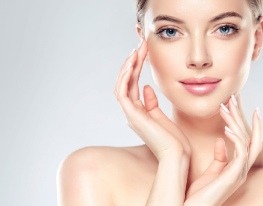About Us


Cosmetic and skin care products are used by men and women across the world, as part of their daily grooming practices.
Sensitive Skin
Cosmetic and skin care products are used by men and women across the world, as part of their daily grooming practices. These include cleansers, astringents, shaving foams, moisturizers, sunscreens, face washes, scrubs, fragrances, hair products, nail products, colored cosmetics, deodorants etc. The average adult uses at least 7 different skin care products each day. However, only 0.2% of this population experiences any side-effects which are directly related to the use of these products.
Problems can arise either with the first few applications, or after years of use. Once your skin is ‘sensitized’ against a certain skin care product, it tends to become prone to such a reaction against most skin care products. This is when patients come to us complaining about ‘sensitive skin’. This is a state when the patient experiences redness, flaking, discomfort and burning sensation soon after the use of common skin care products like face washes, sunscreens etc. This can be a simple irritation or a true allergy. Such patients realize that they can no longer use any colored cosmetics either. ‘Sensitive skin’ can also occur as a result of certain medications, notably steroid creams, anti-acne and skin-lightening creams. Uninjured skin is an excellent barrier to most substances found in cosmetics and skin care products. If skin is over-dry or injured, the openings make that barrier less protective. Treating a patient with sensitive skin requires time, diligence and patience; both by the patient and the dermatologist!
Some patients are allergic to specific ingredient(s) in a product. In such a case, the patient experiences itching, redness, blistering and swelling. Such a reaction is called ‘allergic contact dermatitis’, and the patient will react in a similar fashion each time they come in contact with the culprit ingredient. The specific ingredient can be identified by doing a Cosmetic Patch Test. Here a sticker containing some aluminum discs of 8 mm diameter is pasted to the skin on the back. Each disc contains a separate ingredient. The sticker is taken off after 2 days and reading is taken on the 2nd and 4th day. Fragrances and preservatives are the most common allergens.
If you are allergic to fragrances, buy products which are labeled as ‘fragrance- free’ or ‘without perfume’. Some fragrance reactions occur only when the skin in contact with the fragrance is exposed to sunlight. Individuals with dry and irritated skin may experience itching or burning on using astringents (toners). Similar reactions may be noted with cleansers and soaps.
Sunscreens contain chemicals that absorb, reflect or scatter light. People can sometimes be allergic to these chemicals. There are no known allergies to physical sunscreens. Shampoos and conditioners are not very common causes of allergies, as they come in contact with the skin for a very short period and are rinsed away quickly. The fragrance in deodorants and the aluminum salts in antiperspirants rarely cause problems. Skin irritation can occur if these products are used on already irritated skin, eg, soon after shaving. If you use colored cosmetics like blush, lipsticks etc., look for products that are ‘hypoallergenic’. Acne prone patients must look for cosmetics and skin care products which are labeled as ‘non-comedogenic’ or ‘non-acnegenic’.
Semi-permanent and permanent hair dyes can cause an allergic reaction on the scalp and face. Ammonia and PPD (paraphenylenediamine) containing dyes can also cause hives and wheezing. Even black henna contains PPD. These products must be tested on a small area of skin behind the ear or inside the elbow for 24 hours before using. Vegetable-dye based hair colors are now available, and are a welcome substitute. Hair should not be permed more often than every 3 months. Nail polishes can also cause allergic reactions on the fingers and eyelids (by transference). Long term use of artificial nails and sculptured nails can lead to nail infections and make the nail weak and brittle.
Cosmeceuticals – These are products that come between the definition of cosmetic and pharmaceutical. These are skin care products designed to go beyond strictly coloring and adorning the skin. These products actually improve the functioning of the skin and maybe helpful in reducing pigmentation and preventing premature- ageing. Vitamin containing creams, sunscreens and anti-ageing creams are included in this category. Dermatologists know how to use these new cosmeceutical ingredients and can customize skin care routines for their patients to achieve healthy and youthful skin. Our facility offers a range of more than 10 different national and international brands of dermatologist- tested cosmeceuticals, to cater to the needs of every individual.
